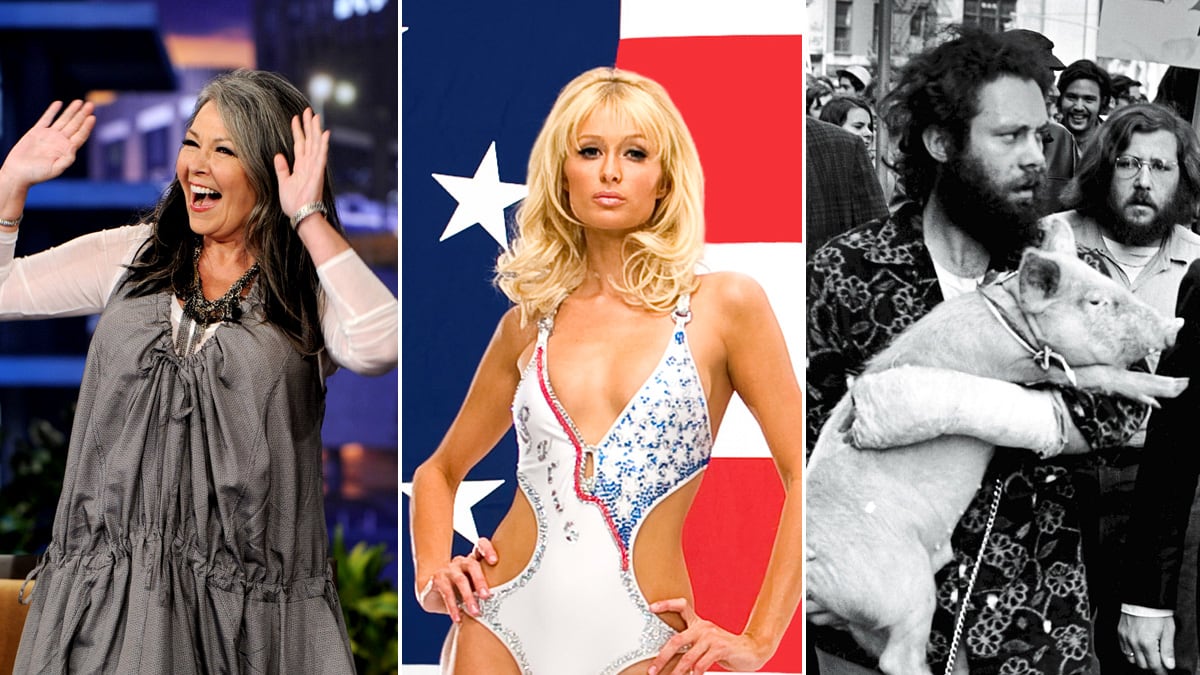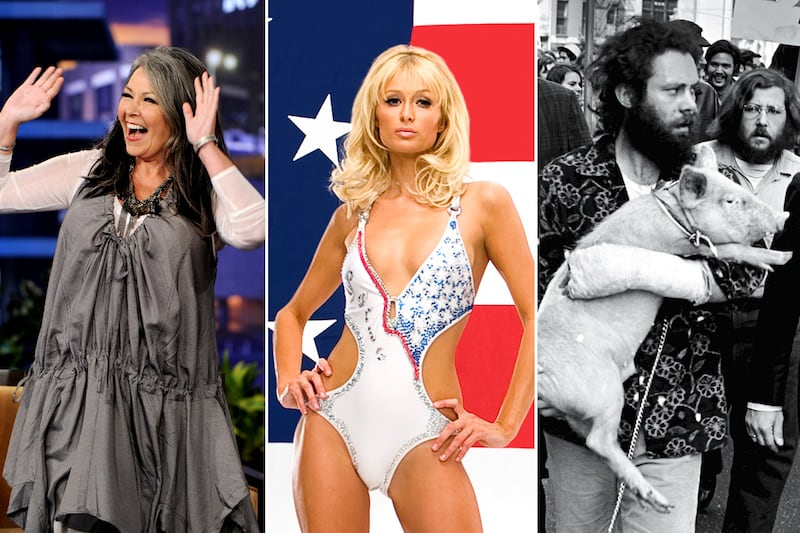
When Stephen Colbert announced his second run at the presidency this week, he was following in the footsteps of more than 70 years of fake presidential campaigns. From Paris Hilton’s promise to paint the White House pink to Pigasus the pig demanding a foreign-policy briefing at the White House, there’s no better way to liven up a campaign season than with some hilarious, and often tongue-in-cheek, political jokesters. Here’s a look at the most unusual and entertaining mock campaigns to vie for office. None went on to snag an election, but who knows: 2012 could very well be Colbert’s year.
Kevin Winter / Getty Images for the Tonight Show ; SwagHouse Media via Getty Images ; David Fenton / Getty Images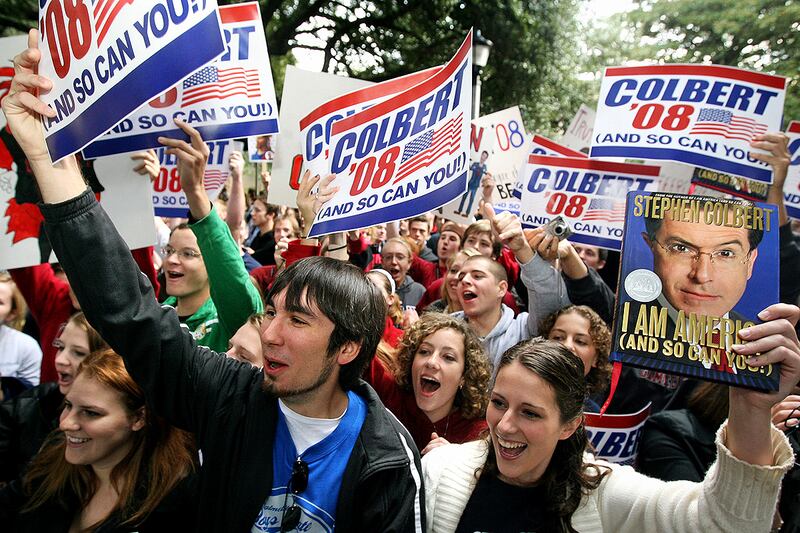
“Nation—should I run for president of the United States in South Carolina?” Stephen Colbert asked his audience on The Colbert Report last week. The ensuing roar of applause was a good indicator, and Colbert isn’t one to turn down the demands of his country. The comedy show host previously tried to run in the 2008 election in his home state of South Carolina, but the state’s Democratic Party wasn’t impressed with his promise to “crush the state of Georgia,” and voted him off the ballot. That lack of faith didn’t derail his aspiration, and the comedian formed a Colbert super PAC called “Americans for a Better Tomorrow, Tomorrow,” which he’s already passed control of to Jon Stewart. Colbert is also gearing up to run as a write-in candidate on the GOP ticket in South Carolina, where he’s already polling higher than (real candidate) Jon Huntsman, at 5 percent of the vote.
C. Aluka Berry / The State-MCT via Getty Images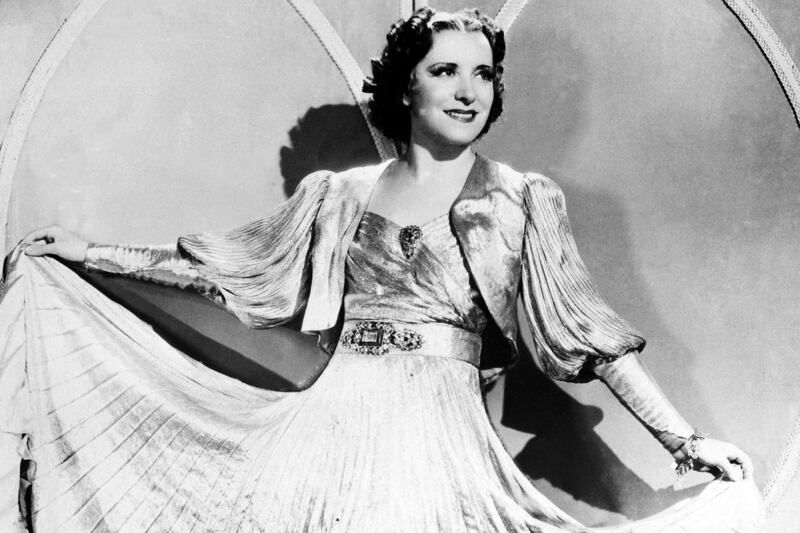
Comedian Gracie Allen’s campaign for president in the 1940 election was hatched one night when she sat at home with her husband and comedy partner George Burns. “I’m tired of knitting this sweater,” she told him. “I think I’ll run for president this year.” And in a nation slowly recovering from the Great Depression and World War II, Allen launched one of the most successful fake presidential runs to date. Burns and Allen, who hosted one of the most popular radio shows of the time, created a new party called the “Surprise Party” and Allen’s campaign took off. She soon received an endorsement from Harvard University and a small Michigan town elected her mayor (she was disqualified for not being a resident). The duo embarked on a nationwide train campaign, promoting their party with a new mascot (the kangaroo) and optimistic slogan (“It’s in the bag”). Her first announced platform was titled “Unemployment and where to get it,” and she also suggested putting members of Congress on a commission basis. What started as a publicity stunt had became a national phenomenon, and by Election Day, beloved candidate Allen actually received an estimated 42,000 votes, but failed to beat out Franklin D. Roosevelt who snagged an unprecedented third term in office.
Gamma-Keystone via Getty Images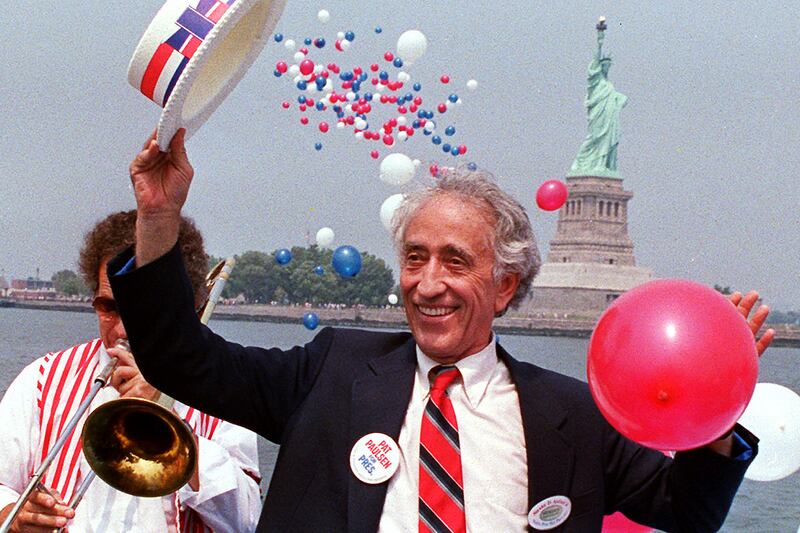
In 1968, comedian Pat Paulsen announced his candidacy for president on CBS’s The Smothers Brothers’ Comedy Hour. Audiences loved his deadpan satirical speeches, blatant parodies of lying politicians, and criticism of the other candidates. His performance on the show won an Emmy later that year, but it didn’t end there. Running on the Straight Talking American Government (STAG) Party ticket of his own invention, Paulsen campaigned in every election but two between 1968 and 1996 with campaign slogans like “If elected, I will win” and “Just a common, ordinary, simple savior of America’s destiny.” For a man who said he originally ran only because he couldn’t dance and the presidency offered a good retirement pension, Paulsen actually received almost 11,000 votes in the Republican primaries of 1992 (despite his interpretation of the Second Amendment as “the right to arm bears”).
Marty Lederhandler / AP Photo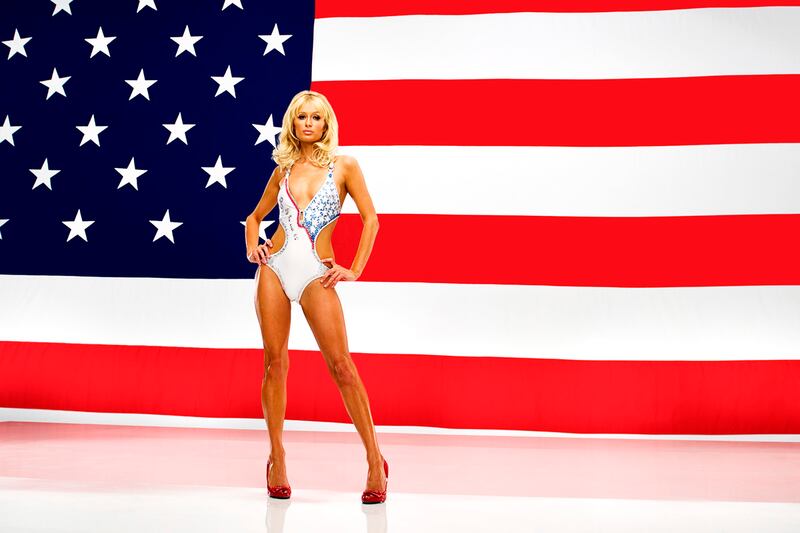
When Republican nominee John McCain compared Barack Obama to Paris Hilton in the midst of the 2008 presidential campaign, he would never have guessed that the model-turned-singer-turned-actress would take this as an invitation to enter the cutthroat race herself. Hilton teamed up with Funny or Die to create two videos exploring her fake candidacy. “That wrinkly white haired guy used me in his campaign ad, which I guess means I’m running for president,” a bikini-clad Hilton shrugs from a poolside lounge before launching into an incredibly thorough energy plan. In the second video, the pop princess got some guidance from experienced fake president Martin Sheen, star of The West Wing. “Running for fake president is a little daunting,” she reveals to Sheen, who seems to support her platform (“Love it!” he tells her) before being interrupted by a drink-holding Charlie Sheen, who promises to fake-vote her. Unfortunately Paris’s run ended with that and the White House never got its chance to be painted pink.
SwagHouse Media via Getty Images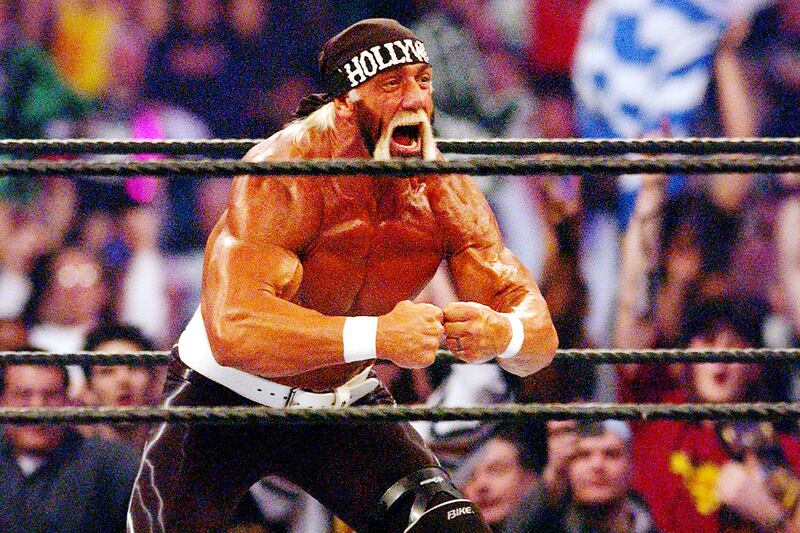
As his career seemed to be winding down, professional wrestler Hulk Hogan told Jay Leno on The Tonight Show in 1998 that he would be retiring from the ring to tackle his next goal: the presidency. "Would you be willing to challenge Hussein to a steel cage death match in some neutral territory like the Bahamas?" Leno asked him. "If it could save one American life... I'd fight him till I die," Holgan replied. In 2008 he told Newsweek that he actually did think about running after doing a couple test markets. “We started getting this crazy feedback that kind of scared me a little. I backed out gracefully,” he said. But the idea stuck in his head. In October, the pro wrestler had grown disillusioned with President Obama and offered himself as a solution, “I should be president,” he told Fox News. “I know nothing about politics [and] think a flat tax across the board would straighten everything out.”
George Pimentel / WireImage-Getty Images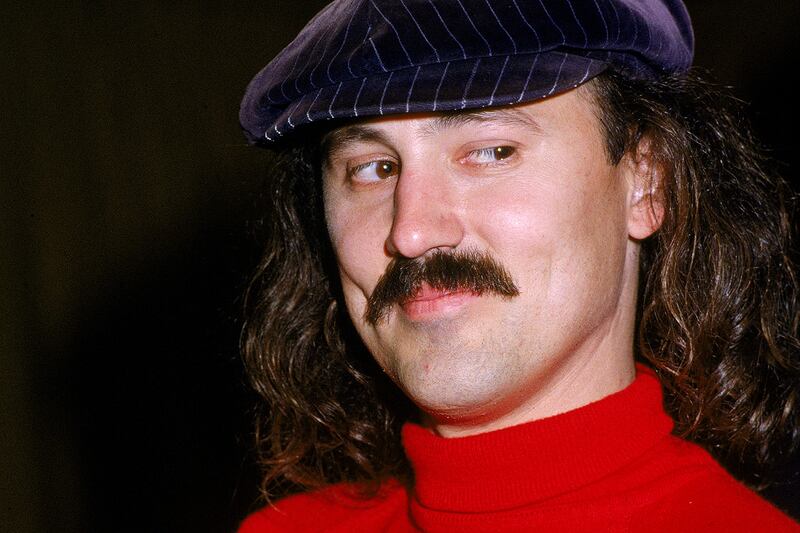
Among such candidates as Hustler publisher Larry Flynt, porn star Mary Carey, and actor Gary Coleman in California’s 2003 gubernatorial race, was Gallagher, a comedian famous for his fondness of smashing watermelons on stage with a hammer. In a state that elected movie star Arnold Schwarzenegger that very year, Gallagher offered this rationale: “If the world is going to be so silly to consider celebrities as viable candidates, then why shouldn't I run?” He based his campaign on a platform promising to ban people from talking loudly on their cellphones and requiring the national anthem to be sung in Spanish at sports games. But behind the comedic veil, Gallagher told reporters he was campaigning to bring attention to issues he found important, like the energy crisis and rampant unemployment. Unfortunately, his good intentions didn’t garner a large turnout at the polls, and he ended up with fewer votes than both the porn star or adult-magazine editor.
Fotos International-Getty Images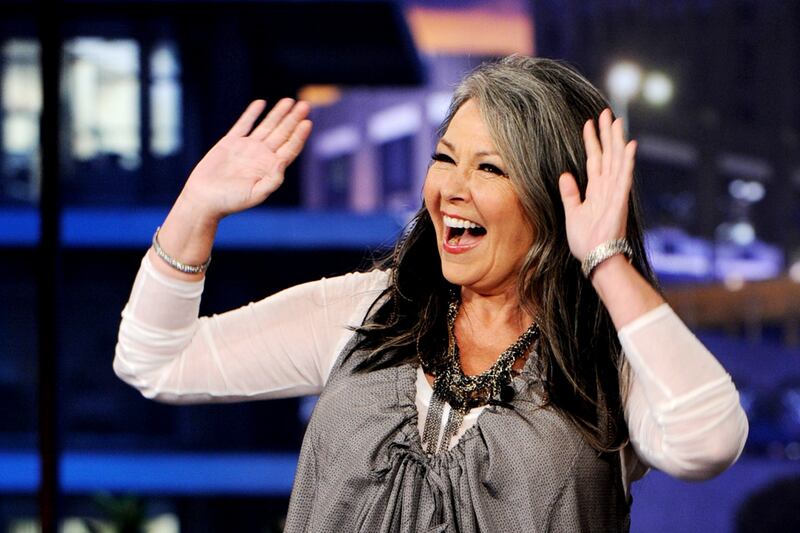
Comedian and reality-TV star Roseanne Barr tried to tap into Jay Leno’s election luck when she announced her candidacy for president on the same stage where Arnold Schwarzenegger and Hulk Hogan did. Running on the “Green Tea Party” ticket (because the other parties “suck”), Roseanne promised to eliminate money (because “you can’t eat money”), along with taxes, student loans and debt, and decisively chose all tax-paying citizens as her vice president. Leno took the opportunity to show some possible bumper stickers for her campaign, including “Roseanne: Finally a president who can’t get the maid pregnant.”
Kevin Winter / Getty Images for the Tonight Show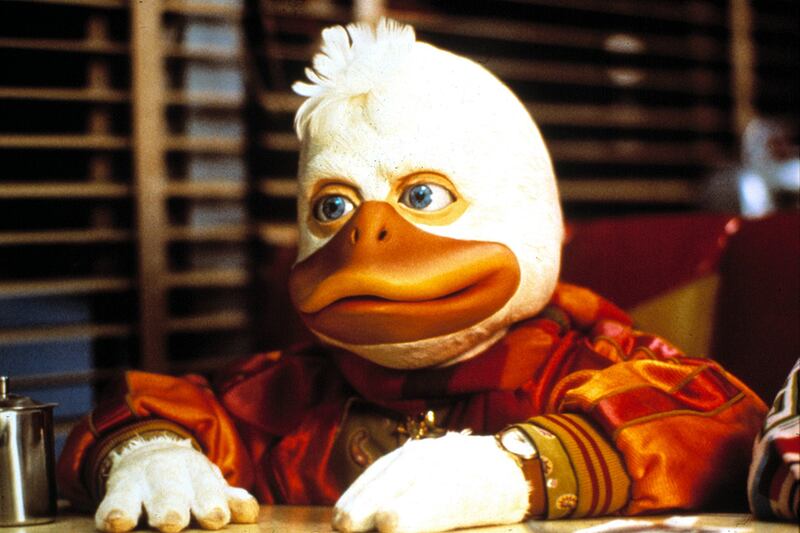
The red, white, and blue buttons from the 1976 election had a slightly devilish cigar-smoking duck in the background and read, “Get Down America! Vote Howard the Duck in ’76!” After foiling an assassination attempt in one episode, Howard, an ex-con duck from a popular Marvel comic book, decided to run for president with the “All-Night Party,” if only because he didn’t have any big plans between then and November. A later scene, his campaign manager replies to criticism from Howard’s friend about his scripted platforms, saying poignantly, “Today’s candidate doesn’t think…he recites—nice, safe, pre-tested bromidic bombasts.” Unfortunately, Howard’s presidential aspirations crashed with a sex scandal, but not before his campaign took off in an America still reeling from the Watergate scandal and his buttons became omnipresent on college campuses.
Universal / Courtesy Everett Collection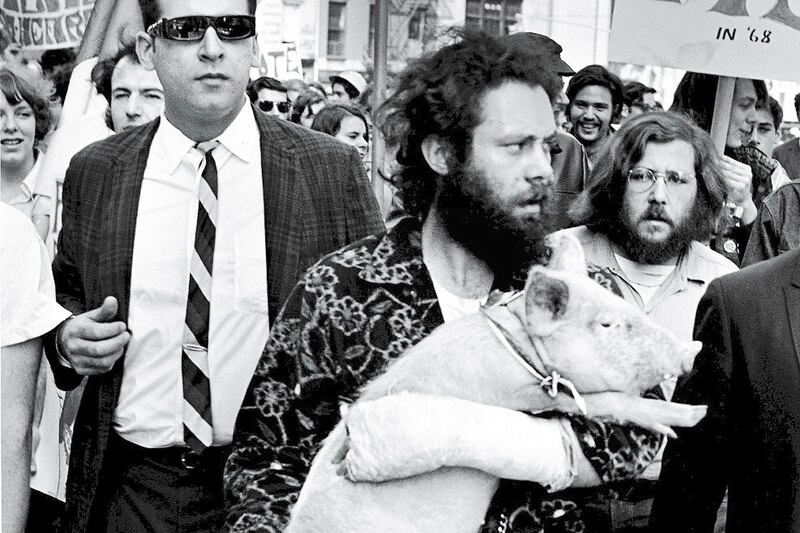
Outside the 1968 Democratic National Convention in Chicago, thousands of anti-war protesters rioted and marched against President Johnson’s Vietnam War policies. Amid the chaos, activists Jerry Rubin and Abbie Hoffman were holding a very important press conference, announcing the newest addition to the presidential race and their answer to candidates Hubert Humphrey and Richard Nixon—a pig named Pigasus the Immortal. Rubin, a member of the pseudo-political party called the Yippies, demanded Pigasus immediately be brought to the White House for a foreign-policy briefing and given a Secret Service detail. The announcement was not without its hitches—not only did the newly minted pig politician escape and run squealing through the crowd, but it was soon arrested along with Rubin and Hoffman. At their trial, folk singer Phil Ochs recalled the events in his testimony: “Jerry Rubin was reading a prepared speech for the pig,” he told the court. “The opening sentence was something like, ‘I, Pigasus, hereby announce my candidacy for the presidency of the United States.’" Later that year, Pigasus returned to the public eye flocked by sign-carrying supporters in a parade from Hudson Pier to the East Village in New York City.
David Fenton / Getty Images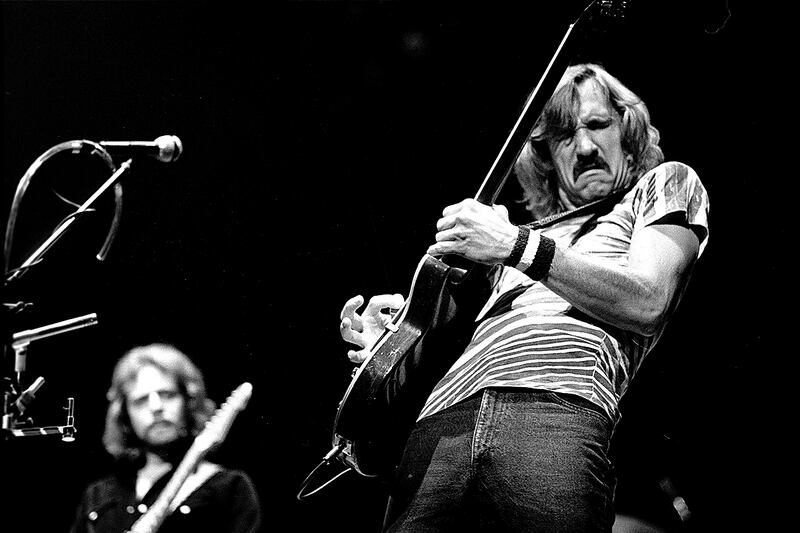
Free gasoline for life is a tempting offer, but apparently not good enough to elect Eagles guitarist Joe Walsh into the Oval Office. His first bid for the presidency in 1980 promised a national anthem change to “Life’s Been Good.” Unfortunately, his mock campaign didn’t get far because the rock star wasn’t yet at the 35-year age requirement to the president. He tried for the vice presidency in 1992—this time with a promise of free toilet paper for everyone—but to no avail. Despite two failed runs, Walsh hadn’t lost all hope. “This guy, I can top,” he said, when asked if he’d consider running against George W. Bush in a 2002 interview.
Richard E. Aaron / Redferns-Getty Images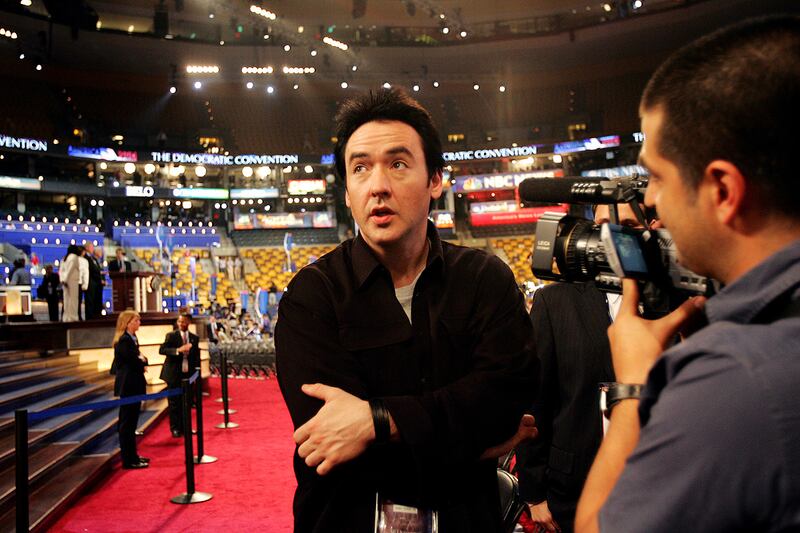
Unbeknownst to the film star, a small political group started by two former members of Bill Clinton’s administration nominated John Cusack as their pick for Democratic candidate in the 2004 election. To validate picking an actor with no political background, the group’s website cited Cusack’s acting credentials, noting that “He’s cooler than John Malkovich,” and “He made the tough decisions in Grosse Pointe Blank.” Just three months after launching the Cusack for President campaign, the group had gathered 200 volunteers for their cause. The problem ended up being on the star’s side—when the campaign contacted his publicist, they were told that Cusack was on vacation and couldn’t be reached. Never fear, the group had a fallback Cusack: “We like his sister, Joan, a bunch,” they posted on the website.
Amy Sancetta / Getty Images
